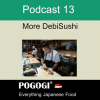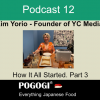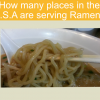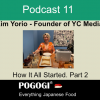Podcast 7 - International Sushi Master & Entrepreneur Travis Kamiyama
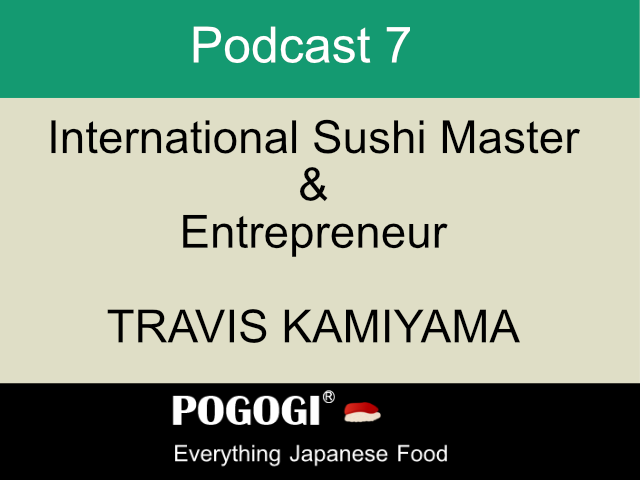
Podcast Transcript:
Po: We're back at you with another Pogogi podcast, and we are super excited for today's guest. Now, I met this guest today's guest back in 2013, and whether you love Japanese food, if you are a restaurant tour or you need superior food contract services or you are an aspiring restaurant tour, today's guests Travis Kamiyama, is a name that you need to know.
From an early age, Travis finessed his culinary craftsmanship in Japanese cuisine with his Japanese upbringing and training with a sushi and tempura master at the age of 14. Then in his twenties, after earning his economics and business degree, he expanded his culinary artistry in establishing solution oriented and profitable restaurants. From his first restaurant opening at the age of 29 to his most recent Royal Caribbean International Izumi restaurant, his culinary expertise as vast with his à la cart, marine and cruise ship restaurants, as well as high volume sushi catering for large events and exclusive events for high end VIP clientele. - kamiya.io
Travis Kamiyama has worked with Honda, Toyota, Japan Airlines, the L.A. Dodgers and many more. Look, Travis Kamiyama is top shelf for all things Japanese food. And on top of that, he's one of the nicest people you'll ever have the good fortune of meeting.
And with the popularity of Japanese food related shows on Netflix and Amazon Prime, I've always thought they needed to reach out to Travis because he is the man. I mean, listen, if you are familiar with the crunchy tempura bits found on sushi rolls. Travis was doing this back in the eighties.
His website is kamiya.io, and without further ado, I'd like to welcome Travis to the podcast from L. A. Travis, thank you so much for being with us today.
Chef Kamiyama: That my pleasure. Greetings!
Po: Thank you, Travis. Look, I got to ask you, this is our standard issue question because our website is all about people who love Japanese food. Standard issue question for you, with your background as a legitimate Japanese training chef, I'm dying to know what your favorite Japanese food is?
Chef Kamiyama: Well, that's a grand question. And, um, you know, I think that majority of the people would point out to some super exotic things, right? I mean, what comes to mind when you think of the best you know, fish that you can get from all parts of the world? Or what about the, and the most prized wagyu beef, right? You know, wagyu beef from like, Miyazaki or Hokkaido.
So you know, I would shock you that I'm a very simple guy. And honestly, my favorite is something very nostalgic, and it goes back to the roots. Ochazuke. You know what that is?
Po: Oh yes, that's like home. Like, feel good? Comfort food.
Chef Kamiyama: As a traveling chef for a lot of these clients, you're going to drink quite a bit alcohol. And the next morning you're dying for some recovery, right? So Ochazuke is such a comfort food, and nothing will come to my tummy and make me feel restore like hot Ochazuke.
Sake Ochazuke, the salmon dried salmon, in particular. So that that is, honestly one of my favorite comfort foods.
You know what that is also my favorite flavor. And you know what? For those who aren't familiar with that, can you explain to our listeners what Ochazuke is?
Ocha is tea, and basically zuke is like rice inside of Tea. It is basically uncooked congee? You can deal with cold rice or, you know, room temperature rice. I like my burning hot. I'll probably put in a microwave if it's like room temperature and literally pour, like the Ochazuke from Nakatani and which is like a very like standard Ochazuke. It’s not the high end ones, right? But it's just the whole flavor profile of this clean, green tea or ocha. The flavor on top of this like small fish particles and the consommé that comes with it with the nori and crispy rice that's inside of it. And the dried salmon I mean, I don't know, man. It's like, you know, nothing takes me back when I'm eating that in the morning. I'm just like, oh my gosh. I'm just so, like, happy. Just be eating that.
Po: It warms the soul.
Chef Kamiyama: It does. It really does.

Po: Okay, maybe a follow up question, your second favorite Japanese food?
Chef Kamiyama: So, of course you know, I'm a sushi chef. So, I like really clean, like the backside of the bluefin or even the bigeye tuna, right? I'm a tuna guy. Um, the flavor of tuna with proper soy sauce and some home wasabi or the real wasabi.
That whole flavor profile only comes from tuna, it doesn't come from other fish. And it's a very again nostalgic. Doesn't have to be the home maguro, or the bluefin. But it can be akami like, bigeye or yellowfin tuna. I mean the quality Tripoli or the A kind.
But it's just that the whole tuna, wasabi, soy sauce flavor and how it goes in your mouth and how your tasting it. Only maguro has that taste, that particular taste on a hot rice or nigiri style. Or sashimi or chirashi. All those work for me like plain tuna. And of course, I like toro and stuff like chutoro, but I can't have a lot of it. It’s funny, because I eat pretty kind of crisp, refreshing stuff. I love serving what the clients love, that's like rich like the best umi that you can get from Santa Barbara. Like Wagyu, like an amazing A5 wagyu piece with garlic. But, you know, at the end of the day, I like the cleaner flavor.
Po: I have another question for you, Travis. As you as you just mentioned, you’re legit Japanese trained chef. And in Japanese culture in Japan, there is that apprentice style or mentorship kind of system that you've got to go through, right? So how important do you think that very hardcore apprentice style system of becoming a Japanese chef is? And do you think there's a way to accomplish the same focus, dedication, discipline and expertise in a shorter amount of time?
Chef Kamiyama: Yes. That's a really like a deep question. And, you know it is absolutely possible to fast forward that. So, I would say sushi with such lengthy history and the fact that there are really no schools out there even though there are now academies. This is the only way to learn, the old school way, because I mean, I grew up as a Gen X, basically had to go through the lowest, as a dishwasher, then all the way up. So it's important just to earn the respect. I would just tell, like all the people in the world that if you don't have respect for cooking or food or the culture, then you're kind of missing the point right there.
So in order to earn the respect you do have to go through, some of the steps like that are gonna resonate with you. That's gonna stay with you that you know where you wash the rice, as if it's like, you know, every bit of it and appreciating the farmers. And doing all the prep work before you start holding a knife and slicing fish, which comes way after. But it's really about the respect factor and really understanding the beauty of Japanese tradition, which is like, you could take forever to become a master?
And it is important and you can, at the same time we are in 2021, that that has been transitioning quite rapidly. All those things have fast forward and it has become very mainstream. There are a lot of times that people just start putting the fire and just like, just do it right. Um, it's mainly for business purposes, for whatever reason, that may be, but it's because they're needed. And so, they might fast forward to skip a lot of the trainings, but there are ways to expedite it, depending on the individual. Like if they're serious about it. I mean, there's so much like social media out there (YouTube). You watch, visualize it and you do it, which is great. But then the other component that's really missing is you have to feel it. You have to literally feel it with your with your hands and go through the motion, and nothing will replace that.
That's why it's so important to have a sushi chef that’s proper to guide you along that way, right? And he or she can actually give you the pointers of the trade secret of this must be this way. And you know, I could probably do that class in a 7 to 10 day hardcore 10 to 12 hour class and give a crash course on that right?
But you know, again, knowledge is great, but it's repetition, man. You need to do 2000 times or more, right? So they might have the essence of you know, basic foundation. However, knowing it and actually doing it, actually being able to master it is a whole different thing.
So, that's my input there.
Po: So for aspiring Japanese chefs in North America that perhaps don't have the opportunity to train in Japan, what kind of advice just to kind of dovetail off of the last your last feedback here. What kind of advice would you have for inspiring Japanese chefs who again don't have that luxury of training in Japan?
Chef Kamiyama: There's a place in L. A. I'm not sure about New York or other cities, but it's called Sushi Chef Institute, and the chef Andy Matsuda, does that. He does like beginning or intermediate or advanced courses. And they can be as short as once a month. I mean, he does one on one sometimes.
So I think, honestly, if you could go through that, it's really essential, because you'll know every tool that need to be. And you'll know the language like, you know, the lingo. So it gives you a foundation. However, that doesn't mean you're going to get a job. You know, it just means that now you're shown the seriousness to a possible employer.
And then you do have to go get an experience somewhere. And then also on the flip side, I mean, if you really are interested in that, then go intern or do something, with a reputable restaurant that inspires you and see if you can hang around the kitchen. And see if you can actually get in there, you know, for X amount of time and see if it's really for you, because it may be something that you really don't want to do.
So, I mean, kitchens are brutal. It's not easy if you if you don't love it. And if it doesn't, if it doesn't come from the heart, you should not be in there because it is brutal, and it is long, and it is unappreciated.
You have to excel like, be over and above an average person to really shine through there and take a lot of heat. Take a lot of, sometimes like mental abuse or whatever it may be, verbal abuse, to get through it, because literally I mean everybody's trying to perfect it right off the bat.
There is no, like a practice 100 rolls a day in the back, right? Ingredients cost money, and time is money for a lot of these operators, right? I'd say try to get a basic course through a sushi institute or academy. They have one in Tokyo as well called the Tokyo Sushi Academy. Of course, it's gonna cost you way more because you have to fly out there and then you know, cost of living is kind of high. I mean, it's going to be more expensive, but they do have a legitimate school out there.
And perhaps, Europe does. I'm not 100% on that and, you know, possibly on the East Coast. I'm sure there's one in, like New York and stuff.

Po: Well, I think there's something to be said about, that hard core apprentice the seriousness and I suppose craft. Because when I had that amazing opportunity for you to cook for me, I think it really shows. I mean, it’s night and day when someone has really perfected the craft and it really shows.
Chef Kamiyama: Thank you so much for that. One thing I do have to add, though, is I think over the last couple of decades it has changed, especially even the last 10 years. Chefs of the old, you know in the eighties, nineties, they really didn't show you a lot. Like you really have to just, like, prove yourself for years before they would be like, “come here, let me tell you how to slice this fish or give you this little you know,” they wouldn't just do that.
Po: Before they divulge their secrets.
Chef Kamiyama: They would be just like, “get out, just like go away”. You really have to like, look and observe and do it like secretively or discreetly and once in a while, if you're really good with them and they know you're trying hard. They might give you a pointer here and there.
But they're not going to be like “come here, let me teach you every single thing that I know.” Usually not like that, nowadays might be different, but, oh, my goodness. When I was growing up, it wasn't like that at all.
Po: Correct me if I'm wrong, but that would you think that that is their way of trying to determine whether or not the Apprentice is serious?
Chef Kamiyama: Yes. You know, Japan, it just takes forever. Because there they are experts in whatever they do. Whether you sharpen knives all your entire life or you're a sushi chef for the entire life, nothing comes overnight for sure, you have to earn it, and you have to hone it, and you have to earn their respect.
So, you know, it's just that you're right. I mean, they're testing you, and they want to see how committed you are, and they believe in a long process. It's not like, let's just see you in a year or two, and then you're a master, right? You've got to really put in the dues, you know?
Po: So, with the state of the world as it is with covid 19 and and things like that, I think it's really excellent that we have you on the podcast city because you are such an expert. Um, So I'd be interested to know, with the pandemic wreaking havoc on the food and beverage industry around the world, um, I'd like to ask, as a global consultant, which you are, um, what are your thoughts on the current state of affairs?
Chef Kamiyama: Yes. Thank you for that very vast question. That's quite deep. It literally it took us by surprise. Uh, like overnight it just like, because I was actually on a cruise line, Freedom of the Seas, bringing her back from Spain, and this happened like, I guess late February. So I left Spain, Cadiz, Spain, on a dry dock, which means a revitalization of and, my 24th Izumi launching and we left the ship and literally in the yard and three days after I left Spain. That's when they shut down the country.
So it was crazy as far as how this pandemic just, as we were doing a 10 day crossing over to Puerto Rico, which is part of America. I mean, we were denied entry there, so we had to actually go to Miami and get, you know, get unloaded, like, in an emergency, or disembarked. But, honestly, it's been crazy has been a major disruption. However, I'm from Los Angeles, which came after because New York was his first super hard. And then, L.A. came later, but we're such a concentrated place that you know what's going on over here, is just intense.
We just had the governor, allow us to open for else I sitting very limited, but I'd say for a couple months and then you know, of course during the intern, like mid part of last year, it was just insane in terms of how many mom and pop shops disappeared. And even some giants did to like a lot of the chain restaurants they didn't survive this one.
I'd say like that ghost kitchens are in deliveries, also delivery apps are all picking up because it's convenient, the lockdown and stuff like that. But, all I can tell you is that our way of dining and how we, looked at restaurants has changed forever.
I think the delivery aspect and the pick-up and the whole you know, the APP thing is not going to go away. People finally realized, and they have to learn quickly and shift right. Radically shift. That's why Doordash became, like, a billion dollar company or something like that. They have to radically shift to, to adjust to the pandemic, right? And so, it's really sad to see a lot of the niche, iconic restaurants go away, that’s been there for so many years in many communities.
I'd say that the heart of chefs and stuff, they are still around that they will make some come back. It will take time. I'd say 2021 is going to be a hard crawl. We are still recovering, and we have some subsidy from the government and stuff, but it's gonna take time. There are so many people in the food and beverage industry that had been laid off. Either they had to switch industries or they were relying on the government. Honestly it's gonna be a slow comeback. Um, hopefully like June, July is going to be a strong points. I talked to a lot of executives they are thinking that July would be the key months where a strong comeback takes place.
I heard even, with the vaccine you have to have 78% of the people vaccinated. We only have 2% of America right now at this particular time. So, there's a lot of variables in this, but people have to eat, you know, it's just the way that we are used to dining out has changed radically, and it will never go away. But I don't know if it will ever be at that level. You know, pre covid, right?
So we as operators are becoming very, very creative on our packaging. I mean, everybody is investing a lot of their time and effort on packaging, you know properly so that they can be taken out and it could be convenient. It can look very organized instead of just packing in like a Styrofoam. So, it's really radically fast forward, the takeout & pickup and, that whole entire take out industry. So, that's what I see. It's not gonna go away and it will take time before we see the levels of dying out pre covid.
Po: And you are, I guess, you know, I think it would be safe to say you're a subject matter expert. In terms of the restaurant industry, people can would be people be able to reach out to you for advice or consultation services.
Chef Kamiyama: Yes, absolutely! You know, as Japanese, I try to stay humble, you know? So I'm not going to be a know it all. I do network with a lots of executive level people whether its resource or the cruise ships or land based operations. So, yes, anytime, please let them know my contact info. And I'd be able to, either steer them the right way or, hopefully to be able to assist them.
Po: Well, I'll say it for you, because I know you're a very humble man. But Travis is I mean, if you're looking for advice in the restaurant industry, especially in terms of Japanese food, Travis is your man.
Chef Kamiyama: Thank you.
Po: What are you up to these days, Travis? In L. A. What are you working on?
Chef Kamiyama: Well, like I never I never sit around. So as soon as I came back March the 17th, I believe actually, it was the 20th. I flew in from Nassau. I opened the sushi bar in 48 hours in Nassau for Sandals Resorts, and they were closing down the airport when I arrived, of course there's nobody at the airport it was like a ghost town.
But I panicked for about 3 to 4 months. I'm like, Okay, what am I going to do here? However, I was already, you know I'm an entrepreneur, so I had my tentacles out there for a lot of different developments. So I honed in on takeout aspect, but I wanted to do a take out, I mean, for hand rolls - Temaki. I wanted to really hone in on that.

So I'm revolutionizing Temaki right now for, um you know, what I see is the United States, the entire nation and for Europe. So it's basically a premium Temaki with the best sashimi you can get in the best sushi rice and crispy Nori wrapped in a magic wrapper, it's like a nice premium film that you could pull and so easy to use. And we're going to try to basically do a Tamaki revolution, and I truly see hundreds of stores on this one. So I've been working on that for about 7-8 months right now.

Po: Wow. Yeah, I remember the hand rolls that you made that day on the cruise ship. And it was the soy wrapper. The white one.
Chef Kamiyama: Okay, perfect.
Po: It was amazing.
Chef Kamiyama: Oh, thank you. Thank you. I mean its great alternative for people that don't like the nori. But if you have crispy high end Nori, you would be like “Wow” because nori grades, you can do rock bottom, and then you can do, well, super high end like a Nobu or some kind of Michelin star grade.
Po: Now you have an Instagram account, right?
Chef Kamiyama: Yes.
Po: And I don't know if it was on your Instagram account. I believe it was. But I got to ask you, you have a picture with the legendary Iron Chef Masaharu Morimoto. Can you give us a little bit of insight on what the where your connection is there?
Chef Kamiyama: Yes. So, Chef Morimoto, he's a bit crazy, right? And that's why you know people were drawn to him. He really put Tetsujin, the show, Iron Chef on the map. And he was outside of the box thinker. One of my partners from Manhattan Beach, back in, 2003 or 2004 basically work with Morimoto and distributing his beers and stuff.
And, so he came to visit me a few times and one of, you know humble and met in Manhattan Beach, and he would pop by, and I'd be like, whoa, what's going on here, man? And then one time, I actually had dinner with him and we liked okonomiyaki because he's from Hiroshima. So, yeah, Takoyaki together. And I think I drank a little too much, so he had to carry me out, right? But it was, he's a really cool guy, And then we actually had a collab at the Dodger Stadium when, um, because that was my account for about six years. And, you know, when the Hideo Nomo used to throw for the Dodgers in 2000, I mean, it was a big deal.
Po: That name I haven't heard in a long time.
Chef Kamiyama: Yeah, No kidding. So Hideo Nomo because of that, you know, Chef Morimoto was actually gonna become a baseball player. He's actually going to become a pro baseball player until he threw his arm out in high school. But he loved baseball. So, um, he's like, oh, great, Kamiyama is doing things with the Dodgers.
So he tagged along, and we kind of collab together. And we were doing some things at the suite, and Tom Hanks was there and stuff, and I mean, we have great memories like that. Of course, he got so big and that was like 18 - 20 years ago, right? But he's massively successful. He has Momosan and all these different concepts. He’s a cool guy, so it's just that what do you call it? We're all just passionate people.
Po: Yeah, and you know, it's funny because I don't think many people know that he was geared up to be a pro baseball player, either.
Chef Kamiyama: Yeah, exactly. But that that was his passion. And so, you have to be passionate man, to be an amazing chef, because what else is going to keep you going?
Po: Yeah, that's true. That is true. Well, Travis, this has been amazing. Thank you! We're running out of time and, you know, joining us from from L. A. I wish we could chat longer, but maybe if we're if we're lucky you can find time in your busy schedule, maybe we can do a follow up.
Chef Kamiyama: Yes, Absolutely!
Po: You were saying earlier? Um, you know, before the podcast, we were chatting. You have a Facebook, group that you're a part of. Is that correct?
Chef Kamiyama: Yes. It’s called the Sushi Chefs Network. Okay, so just look us up. Just say a line like, hey, I heard you on the podcast. Basically, it’s about almost 40,000 people worldwide, so they’re all pretty much like sushi related people or, aspiring chef. So please get on there. I put some really good content on there.
Po: And you were heading that up, right?
Chef Kamiyama: I’m a moderator. Yes, Awesome. Well, Travis, again, it’s been such a pleasure. I can’t believe it’s been so long that we you and I first met back in 2013. I mean, it’s crazy. But I tell you, if anybody ever has the opportunity to try Travis’s Food, it is ridiculously good.
If you can watch them in action, it’s even better. I remember when I was sitting across from you, sushi counter it was. I felt like a kid in the candy shop, like your knife skills. And your dexterity was superb. I’ve never seen anything like it.
Chef Kamiyama: Thank you, thank you. There’s a lot of masters around. I’m always like, Wow, because of social media, has really taken off. But, hey, listen man. I mean, I’ll never stop learning. It’s just a lifelong journey, so always practicing.
Po: Yeah, again, it's been such a pleasure having you on the podcast. You really can't thank you enough, folks. You got to check out the site, kamiya.io, we'll catch you on the next podcast.
But again, Travis is such a resource. He's such an expert in his field. If you need a resource or if you’re thinking about who can I reach out to in the restaurant world, specifically to Japanese food. You don't have to look any further. Check out his site. Reach out to him. Travis is the man. Trust me, you won't be disappointed. Travis. Thanks again from L. A. We'll catch you again on the next podcast out there. Thank you very much!


